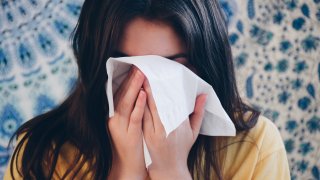
Covid infections come with dozens of different potential symptoms, ranging from mild fatigue to strange ones like "Covid tongue."
Which ones will you personally experience if you get infected soon? It depends on your vaccination status, suggests the ZOE Health Study, a joint project between health science company ZOE and researchers from King's College London, Massachusetts General Hospital, Harvard and Stanford University.
The project recently shared an updated list of the top Covid symptoms reported by the more than 4 million users of the ZOE Covid Study app, which has tracked virus symptoms based on daily user-entered data since 2020.
Here are the Covid symptoms most commonly reported among three vaccination groups — people who completed their primary series, people with one shot from a two-dose vaccine and those who are unvaccinated — ranked by how often they were reported.
Feeling out of the loop? We'll catch you up on the Chicago news you need to know. Sign up for the weekly Chicago Catch-Up newsletter here.
Four of the five most commonly reported symptoms, including sore throat, runny nose, persistent cough and headache, appeared across all three groups — but their prevalence varied. Unvaccinated people more commonly experienced fevers, which didn't appear in the other groups' top five symptoms.
But your vaccination status could affect how many of those symptoms you experience simultaneously. People who completed their primary series or got one vaccine dose reported fewer symptoms over a "shorter period of time" compared to unvaccinated people, the study said.
Money Report
In a 2021 study by the Centers for Disease Control and Prevention, participants with one or two Covid vaccine doses had about a 60% lower risk of developing symptoms like fever compared to unvaccinated people. Vaccinated participants spent on average two to six fewer total sick days in bed compared to unvaccinated ones, the study also found.
The ZOE study pointed to one common finding across all three groups: a noticeable decline in "traditional" Covid symptoms from the virus' initial strain, like shortness of breath and loss of smell.
Shortness of breath ranked as the 29th most common symptom among those who completed their primary series, and 30th among those who are unvaccinated.
Omicron may have something to do with that: Other research has found that the newer variant is less likely than previous Covid strains to cause symptoms like a loss of taste or smell.
The ZOE study did not account for which Covid variant caused the infections, how many infections were first-time Covid experiences, whether a user received booster doses, patient demographic information and the severity of people's symptoms.
Including booster dose data could potentially change the study's list of symptoms, and their potential duration, for people who have completed their primary vaccine series.
Protection from your last vaccine dose wanes significantly as time passes, meaning some people in that study category may be well-protected while others could be closer to those who are only partially vaccinated or entirely unvaccinated.
Your most effective protection against the virus now includes a new omicron-specific booster shot. It's more effective against today's Covid strains than the original vaccines, and early data suggests it'll boost your protective antibodies ahead of an impending virus surge this winter.
Sign up now: Get smarter about your money and career with our weekly newsletter
Don't miss:
- It's time to stop saying 'fully vaccinated' for Covid, experts say—here's why
- Dr. Fauci: These 2 new fast-spreading omicron Covid subvariants are 'pretty troublesome'
- Omicron-specific Covid boosters appear to work well, new data says—regardless of the side effects you experience






